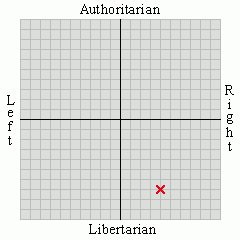Sunday, 25 July 2010
Compulsory voting.
Some people are keen on the idea of compulsory voting, and since it's compulsory here it's no shock that that includes a number of Australians I know. They'll tell you that it keeps the politicians honest and engages the voting public. I'll tell you that I'm pretty sure that's complete bullshit. I've said on this blog more than once, and explained at length here, that far from keeping them honest compulsory voting removes any incentive the bastards have to at least look like they're worth voting for and removes the option of expressing contempt for the whole sorry pack of them by staying away. What's becoming the traditional low turnout in the UK is an indicator of how people feel about the political class, and it's one that Australian politicians are shielded from by the guarantee of almost a 100% turnout every time. As for any idea that it engages the voting public... well, let me tell you how engaged the voting public here are right now, with the federal election just weeks away. Aussies might feel all superior because more Brits vote for Big Brother than bother to vote in elections, but this week a TV debate between quasi-PM cum Woody Woodpecker stunt double Julia Gillard and opposition leader Tony 'Budgie Smuggler' Abbott that had been scheduled for Sunday night had to be put back an hour. You'd be forgiven for thinking that with the voting public so engaged by means of being forced to vote that it can only have been something truly earth shattering to put the debate back. Had Parkes Observatory detected an asteroid on a direct course to hit Toorak? Did New Zealand declare war on us? Was UDI declared in the Northern Territory? No, my friends, it was even bigger than that. The debate had to be put back because it clashed with the grand final of Masterchef Australia.
Engages the public, my left bollock.
Engages the public, my left bollock.
Labels:
Australia,
Oh For Fuck's Sake,
Personal Freedom,
Politics
Subscribe to:
Post Comments (Atom)



















4 comments:
Compulsory voting doesn't engage the public, so you are quite safe.
Voting ,however, isn't compulsory even though the electoral office and politicians say that it is. It is compulsory to indicate that you have exercised your right to vote, or not vote, at the election. I think this requirement was introduced to ensure, as much as is possible, that people could not be prevented from voting and avoid other methods of vote rigging.
Times and technology have changed considerably since these laws were introduced and there is probably a need to adjust the voting procedures a little in line with today's technology.
The fact that we now have professional politicians, educated idiots who have no concept of real life and other sycophants who are all in it for the perks, pensions and anything else they can get their grubby hands on goes a long way to explaining why people are not enthused with the voting process.
Voting papers today should have a few extra squares for "don't know" and "don't care" to try to measure the degree of engagement of the people in the process.
Additionally elections can be a time for assessing the feelings for various issues so that the politicians have some idea of where people think we should be going. I think its called a plebiscite, but I haven't done my homework.
I don't know that there is a perfect system, but I think this system is probably one of the better ones but it could do with a little tweaking to try to keep improving it.
"Compulsory voting doesn't engage the public, so you are quite safe."
Agreed, and I always felt that, but it's been offered by some of my Aussie friends as a justification for compulsory voting, which I wholeheartedly oppose. If I actually believed it did engage the public I'd be less opposed to it, though still of the belief that the right to vote should not become an obligation.
"Voting ,however, isn't compulsory even though the electoral office and politicians say that it is. It is compulsory to indicate that you have exercised your right to vote, or not vote, at the election."
I haven't yet voted in an election here (ineligible last time) but from what Mrs Exile has told me it is compulsory to vote but there's no way for them to check that you've done anything more than show up. It's hard to see how they could make sure you have voted properly without demanding to see your ballot paper after you've completed it, which would mean it was not a secret ballot anymore. In the end the extent of compulsion is arguable regardless of what the law actually requires of citizens, but at the very least turning up at the polling station is compulsory, even if you then vote informally.
That there is any compulsion involved at all I find objectionable, though since I came here freely I can't complain too much. Australia once confused the right to vote with a duty to vote and as a result citizens long ago lost the right to withhold their votes, and that's where I have a problem. I'd certainly consider voting for anyone who promised to fix that.
"The fact that we now have professional politicians ... goes a long way to explaining why people are not enthused with the voting process."
Couldn't agree more. I've written much the same more than once.
"Voting papers today should have a few extra squares for "don't know" and "don't care" to try to measure the degree of engagement of the people in the process."
One extra box right at the top marked 'Abstention' would measure those who dislike all the candidates/parties equally and want to specifically withhold their vote. Ditching compulsory voting would show you the don't knows and don't cares - there's probably a lot of overlap anyway - because they're the ones who wouldn't show up at all.
"I don't know that there is a perfect system, but I think this system is probably one of the better ones but it could do with a little tweaking to try to keep improving it."
Agreed, and again similar to what I've said here before. It is pretty good as is despite my criticisms, but if the changes were up to me I'd want the process to be voluntary and to record abstentions as above, to have a rerun with fresh candidates if the abstentions win, to have no winner at all and therefore no representation for that term if more people didn't vote than did, to change the preferential voting system to the optional preferential voting they use in Queensland, and finally to bring in a recall process so the large number of safe seats are no longer the gift of the main parties. Sounds like a lot more than it really is. The majority of people would see virtually no difference to what happens on election day.
I like the idea of having a box on the ballot paper which reads "None of the above"; more than 20% of papers thus marked would render that particular ballot box ineligible for inclusion in the overall result and trigger another vote with different candidates.
BTW, the so-called secret ballot has been a misnomer here in the UK for some time.
When you go to the polling station to vote you have to identify yourself so that your name can be checked on the voter's roll. You are then given a ballot paper which is serially numbered; that number is entered against your name on the voter's roll.
Your ballot paper is now identifiable after you have marked your choice of candidate.
Steve, for a while I've favoured some form of abstention or none of the above option on voting papers, but I feel the simplest thing to do would be to treat it as you would a candidate. Therefore in a UK election if none of the above has the most votes then it has 'won', meaning all candidates are rejected and a by-election called. Not so sure about the 20% or whatever proportion of a particular ballot box. I can see the appeal but in theory the other 80% could all be for one candidate, and on such things elections can be won and lost. Besides, would you be happy if you had voted for a decent candidate and it was discarded because you dropped it in the same box as a lot of people abstained?
I'm a pom, of course, so I know the way voting works in Britain - indeed, I'm still registered to vote in general and European elections - and that the ballot is, er... shall we say secret for a given value of 'secret'? Given that overseas voters must be a fairly small number and because we have to re-register every year even if there's no election and vote either by post or by proxy I'm sure my vote is even more not-quite-secret than it was before. I doubt anyone ever looked and I've heard that it wouldn't be straightforward to check any particular person's vote anyway. Well, the ones cast at polling stations at any rate. Still, the fact is that it's not really secret if someone was determined enough to see how people voted and that is a problem.
Post a Comment